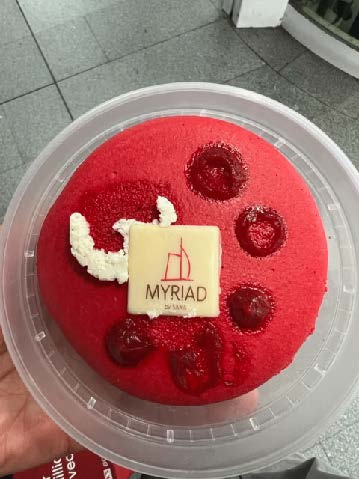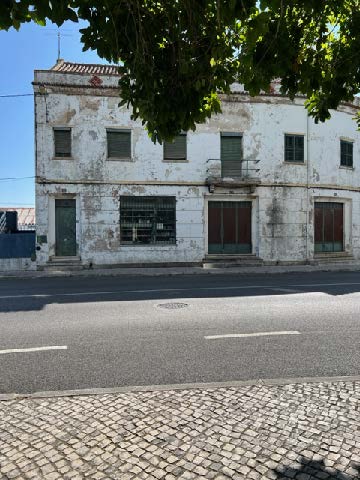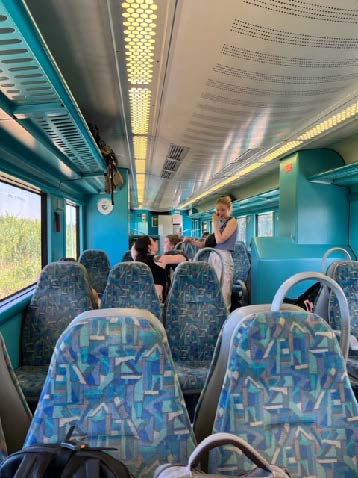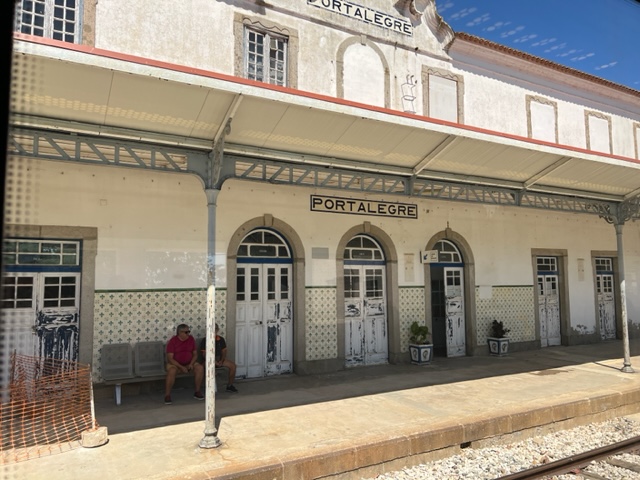Wednesday… We were up early, packed, and down for another wonderful buffet breakfast at the Myriad by Sana hotel as soon as the doors opened at 07:00. As it had been for the previous two mornings, Rita greeted us with a smile and showed us to a table. It was so fun to see her enthusiasm. She was just 16, this was her first job, she was wearing a uniform, and immensely proud to work at one of the finest hotels in Lisbon. Her parents got up early every morning and drove her — a 30 minute drive — from home to work, arriving at 06:15. At the end of her day, they trusted her to take the Metro home. She was, in part, hired because of her English, which made her very proud. As she served us breakfast, we made every effort to compliment her English, and help her learn new words and improved grammar. Fun for both of us.
As we got up to leave, because we had an early train to catch, other staff mysteriously blocked our exit. Suddenly, Rita came running out with a small cake. Bright red; covered in raspberries and chocolate. With a quizzical look on my face, I asked why. She said, “It is your birthday, no?” Perhaps she conspired with Julie? Neither would confess. Another example that, all over the world, kindness is mirrored with kindness.
Off to the train station… We left Lisbon at 08:30 and took three different trains to Madrid, arriving at 22:30. A long, long, long day.
We learned, recently, that philosophers have identified four types of fun:
Type 1 Fun, is fun in the moment. It is dancing, singing, holding hands walking on the beach in the pale moonlight.
Type 2 Fun, may be awful in the moment, but when you look back, the memory is fun. Running a marathon is painful and exhausting in the moment. The next day, the memory is great fun, the pain is transformed to pleasure, and it is something you look forward to repeating.
Type 3 Fun is something you anticipate will be fun, is awful in the moment, and only others can laugh at afterward. Type 3 Fun is hold-my-beer-and-watch-this as you perform some stupid trick that results in a broken leg.
Type 4 Fun is enjoying other’s misery. It is laughing when someone else leaves an important bag as the train speeds away. It is laughing when a friend falls down the stairs and breaks a leg. It is, sadistically, pulling the wings off flies. Germans have a wonderful word for Type 4 Fun — Schadenfreude. It means enjoying someone else’s misery.
Abrantes, Portugal:
A town in Eastern Portugal close to the border with Spain
The Inside of a Train in Western Spain
Julie and I agreed that the trains, from Lisbon to Madrid, especially the second leg from Abrantes, Portugal to Badajoz, Spain, are Type 2 Fun. Misery in the moment, but a story that is fun to tell afterward.
On the other hand, what a way to see all that lies between Lisbon, Madrid, and Barcelona. Western Portugal is lined with rivers that make things grow. Heading east, the rivers go away and the land turns dry — very dry. Heading east, cork trees give way to olive trees, and eventually to no trees. Grass goes away, and even the color in the dirt goes away. It must be exceedingly difficult to eke out a living in parts of the interior of Spain.
Eastern Portugal and western Spain are like western Kansas or eastern Colorado. Arid, hot (in summer), nearly useless land punctuated with random outcroppings of rocks and minor hills. The people who live there scratch out a living stripping cork from widely spaced trees for the world’s wine drinkers. Without thick, moisture-resistant bark, trees would not survive this clime.
People with money fly over this terrain. From 30,000 feet, this terrain and climate has no reality. The trains that cross this barren land are spartan because that is what the people who use them can afford. The temperature through this country in late July was a mere fraction below 100ºF, and worse inside the train. The conductor walked once through the passenger compartment and promised the air conditioning was running as hard as it could. Then, he retired to his small cabin and sealed the door. I suspect all the air conditioning, if there was any, was diverted to his cabin. I have no proof, but I think the dial for the passenger compartment was sadistically switched to “heat” rather than “cool.” Type 4 Fun for the conductor; Type 2 or 3 Fun for us. But, a terrific way to see that part of theworld — off the beaten path, and leave the driving to someone who knows the way.
The middle section of the route, from Abrantes, Portugal to Badajoz, Spain had but a single car on the train. A self-propelled diesel that strained to achieve 60 kph (about 35 mph) uphill or down. Windows sealed shut to make sure none of the imaginary air conditioning escaped. The other two legs of the trip were, by comparison, luxurious. As with most things in life, you get what you pay for. The ticket price for each of the three legs of this trip from Lisbon to Madrid was about $15.
Afterward, I asked Julie if she would do it again (knowing it was our plan to do this again in reverse to fly home from Lisbon). Her reply, “Absolutely!” Proof that I correctly labeled this as Type 2 Fun.
I believe in having only very portable carry-on luggage, no matter what type or duration of the trip. This is especially so on trains. Oddly, one of the advertised benefits of travel by train is that it is easier to take a lot of luggage. Don’t believe it. You have to be able to get on and get off a train in a jiffy. Big bags and lots of bags do not permit quick and easy movement. Train stations always involve vertical movement between tracks and through stations. Not all stations have escalators or elevators.
Another thing about world travel… We always take three bags, each: a roller bag that fits in the overhead rack on an airplane or train, a 20 liter backpack that fits under a seat, and a 2 liter cross-body bag for walks. In my cross-body bag, I carry identification, a credit card, phone, handkerchief, mini-Leica binoculars, a small knife (that I buy once in-country, and leave behind when I leave), cash, sunglasses, a few squares of toilet paper (not every restroom you come across has paper), a local map and 1/2 liter of water).
Arriving in Madrid 90 minutes before midnight, we got our bearings, and walked from the Madrid Puerta de Atocha, which is almost dead-center in Madrid, along the eastern edge of the Parque del Retiro and then north along the Parque Infantil Paseo Del Prado to our hotel, the NH Collection Paseo del Prado. After checking in, the first thing we did was shower — a cold water shower. Then, we crashed.




